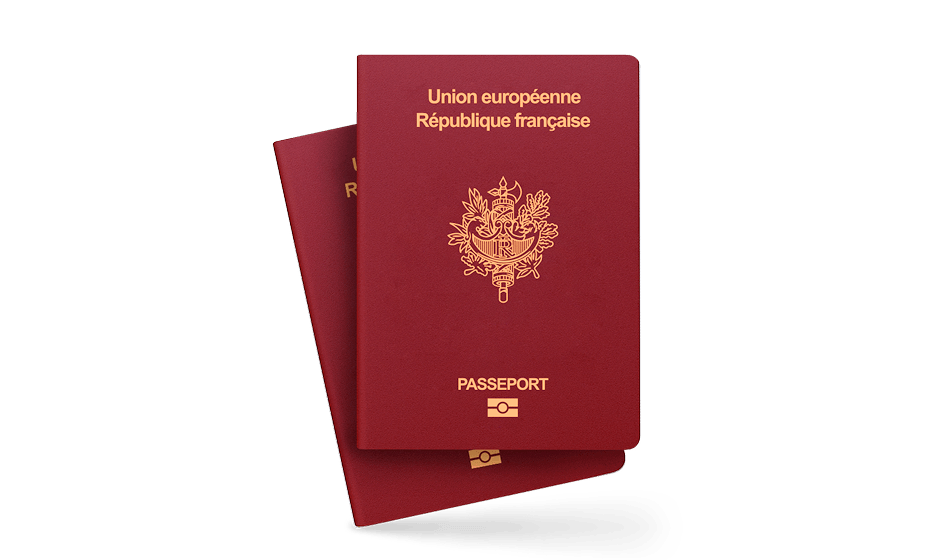Citizenship in France is the stable and legally documented bond of a person with the French Republic, which is expressed by their mutual obligations and rights. Historically, French nationality is based on the principle of land law, which enables anyone born in France or owning property of that country to obtain it. The main legal act, which regulates the registration of a French passport, is the Nationality Code of 1945.
There are a number of ways for foreigners to become citizens of France: by birthright, through naturalization and investment, by purchase of real estate and family reunification, as well as by study, employment, entrepreneurship and service in the French legion. The path to citizenship begins with a residence permit and five years of living in the country as a resident. It is also necessary to prepare relevant documents and know French at B1 level. Read about the nuances and pitfalls of the procedure for obtaining French citizenship in this article.
The benefits of French citizenship
- Visa-free travel to 145 countries, including EU countries and the USA.
- Preserving citizenship of the country of primary residence to minimize tax liabilities (in France the rates are quite high).
- Living in a developed European country with high social and economic standards.
- Opportunity to arrange residence in the EU for family members, paving the way for them to obtain French citizenship.
- A French passport gives you the right to reside and work in any EU country.
- The right to pass on citizenship status to children by inheritance.
- Favorable conditions for innovative business development in major cities such as Paris, Lyon, Marseille, etc.
- Opening an account in a reputable European bank, allowing you to participate in world-class transactions and financial operations.
- Enjoying all the rights of a French citizen, including the right to participate in the political life of the country.
French Nationality Law
The legal basis for French citizenship is the French nationality law as well as the French Constitution. In most cases, citizenship is obtained through the «right of blood» (jus sanguinis), which applies even if the applicant for a French passport was born out of wedlock or in another country. However, there is also the option of obtaining French citizenship by the «right of land» (jus soli), when the applicant only needs to be born or live on French territory for a long time.
Requirements for citizenship applicants
- legal grounds for immigration to France;
- permanent resident status in France;
- financial solvency;
- no criminal record;
- no tax arrears;
- own or rented French apartments;
- knowledge of French language and culture;
- no serious infectious diseases.
Who can’t get citizenship
- Persons related to foreign military forces;
- applicants who are internationally wanted or have a criminal record that has not been expunged;
- people who have not been able to prove their financial solvency;
- violators of immigration laws;
- illegal migrants from various countries;
- people suspected of committing crimes, including terrorism;
- applicants who submitted incomplete or incorrect immigration documents;
- people who do not speak French at an intermediate level.

10 legal grounds for French citizenship
| Ground | Time to obtain (years) | Cost (EUR/thousands) |
|---|---|---|
| By birthright | 5 | — |
| Naturalization | 5 | — |
| Investments | 5 | 300 |
| By education | 7 | — |
| Marriage | 4 | — |
| Purchase of real estate | 5 | 300 |
| Financial Independence | 5 | — |
| Employment | 5 | — |
| Entrepreneurship | 5 | 20 |
| Military service | 3 | — |
Citizenship by birth
Children, who were born in France and have lived there for 5 years or more since the age of eleven, can apply for citizenship. Children between the ages of 13 and 16, who have lived in the country since the age of 8, are granted citizenship upon application of their parents. Individuals who are 16 years old or older can apply on their own.
Obtaining French citizenship through childbirth is quite a popular way for immigrants to obtain an EU passport for their children. In this case, you should arrive in France 2 months before the expected date of birth to have time to undergo a medical examination and process all necessary documents.
Children at the age of 18 who have lived in the country for 5 years on a permanent basis can obtain French citizenship automatically. Foreign children adopted by French nationals are also eligible to become citizens through the normal procedure or by obtaining approval from the Ministry of the Interior.
Naturalization
Naturalization in France is a legal procedure, the purpose of which is to obtain French citizenship for foreigners on a general basis. For this purpose, a native of another country has to live in France for 5 years in the status of a resident. The period of naturalization may be shortened if the foreigner is a graduate of a French university, has unique skills or has been granted refugee status.
Citizenship by marriage and family reunification
A French passport can be obtained through marriage with a French citizen. In this case, the applicant must prove that he/she is legally staying in France, and his/her marital relationship with a French citizen has lasted for at least 4 years. In addition, the foreigner must prove the absence of criminal record, as well as a good knowledge of the national language and the legal framework of French society.
If the French spouse of a foreigner has not lived permanently in France for the last 3 years, he/she can apply for citizenship after 5 years. If the marriage took place outside France, it will be necessary to confirm the marriage at the French consulate of the country where the marriage took place.
Citizenship for financially independent persons
A French passport can be issued to a foreigner, who resides in France as a financially independent person. This requires a foreigner to first obtain a residence permit, proving the availability of funds for living and legal sources of stable income, which are outside of France.
The immigrant will also have to buy or rent a house, take out health insurance and stay on French territory 183 days a year. After 5 years of residing in France, a wealthy foreigner, who has fulfilled all the conditions of their immigration program, can apply for French citizenship.
Citizenship by investment
Citizenship by Investment in France is available to foreigners, who are willing to invest in the local economy in the amount of 300,000 EUR or more. The objects of investment may be innovative projects, commercial enterprises and start-ups, but not bonds and securities. French citizenship by investment can be obtained by residents, who have lived in the country for 5 years.
Citizenship by the purchase of real estate
It is possible to immigrate to France and eventually become a citizen of France by purchasing premium real estate worth 300,000 EUR or more. As a rule, foreigners buy housing in major French cities or in the south of the country, where real estate has a high level of liquidity. Such housing is suitable for permanent residence of the owner, and for profitable rental.
In addition to the purchase of the real estate object, a foreigner should have a permanent job, a stable source of income and a financial security of 12 minimum wages in France. The citizenship of France, after 5 years, can be obtained by the owner of the property, who spent on the French territory 183 days a year.
Immigration by business
Relocation on the basis of entrepreneurial activity is one of the most common ways of getting a legal status in France for people from CIS countries. The country offers good conditions for doing business, including innovative businesses. The French government actively supports international start-ups, investment of which is one of the most reliable ways to obtain residence permit and citizenship of the French Republic.
Foreigners with higher education, entrepreneurial skills and a detailed development plan for their project can take part in the immigration program for businessmen. First, the foreigner becomes a French resident, and after 5 years of permanent residence and successful business in France, he or she acquires citizenship.
Citizenship by employment
In order to obtain French citizenship on the basis of employment, a foreigner needs to find a suitable job and obtain a work permit from a French employer. the same time, the chosen job shall not be claimed by citizens of France, and the salary must be at least 1,200 EUR per month. In order to confirm the relevant qualifications, the migrant submits all necessary documents to the French migration service.
Having lived on the territory of France for 3 years as a temporary resident, a migrant acquires a permanent residence permit for 10 years. However, starting from the 5th year of legal stay in France, a foreigner has the right to apply for French citizenship.
Citizenship after studying
Education in France also gives a basis for obtaining a passport of this country, through enrollment in a French university and successful completion of language tests. After 5 years of study, a university graduate can apply for citizenship status, after living in the country on a permanent basis for 2 more years. If the graduate manages to find a job in France before applying, this will be an additional reason for the migration service to grant them citizenship.
Citizenship by military service (French legion)
Physically fit men from third countries can become French citizens on the basis of military service. They have to apply to join the French Foreign Legion. Applicants for citizenship through military service must be between 18 and 40 years old. Also, he must successfully pass a physical examination and prove that he is in good physical shape. A soldier can obtain citizenship status after three years in the Legion, but can request it even earlier if he is wounded in combat.

How to become a French citizen: 5 steps on the way to obtain a French passport
- Successful passing of the language exam. It is necessary to prove B1 proficiency in French, that is, to be able to read, write and speak the language. Applicants for French citizenship take an oral language test. The test consists of 60 questions that must be answered within 1 hour. Another 10 minutes are given for an interview. In some cases, the applicant may be asked to take a written test.
- Submission of application and documents to the Immigration Service. The foreigner applies at the French consulate or regional prefecture with an application for citizenship status. After that, they receive a list of documents, which must be duly completed, translated into French, apostilled and laced (i.e., assembled in a single archive).
- Consideration of the application by the French Ministry of the Interior. A French consulate or prefecture sends the candidate’s application for French citizenship to the Ministry of the Interior for verification. The legal review of documents and obtaining approval from the authorities takes up to 1.5 years. During this period, the applicant may be invited for an interview at the prefecture and checked for their integration into French society.
- Obtaining a naturalization certificate. If the prefecture gives the applicant a certificate of naturalization, they will be able to apply for a passport. There is a state fee of 155 EUR for this.
- Issuance of a French passport. After becoming a French citizen, the foreigner must sign the Declaration of Rights and Duties of Man and Citizen and then take the oath of office in a solemn ceremony. The immigrant is then issued with a national passport.
The required documents
The standard list of documents that an applicant for French citizenship submits to the consulate:
- 2 copies of the questionnaire signed and dated by the applicant;
- 2 photos 35 × 45 mm in size;
- original and translated into French copies of passports of all family members of the applicant;
- a copy of the French resident’s identity card;
- birth certificate;
- Information on previous marriages and divorces (if applicable);
- certificates of no criminal record in France for all family members of the main applicant;
- certificates of no criminal record in the country of citizenship and each country of residence for all family members of the principal applicant;
- copy of the contract for the purchase or rental of a dwelling in France;
- copies of receipts for rented properties for the last 3 months;
- copy of the last utility bill;
- certificate proving knowledge of French at B1 level;
- state tax stamp worth 55 EUR;
- an envelope with a stamp for sending the application by mail.
In addition to the basic documents, the applicant for citizenship also submits other information, based on the option they have chosen to apply for a French passport:
- marriage certificate and signed by the spouse consent to obtain citizenship (for those who are getting married);
- certificate of employment with income and tax return for the last 3 years (for those who are naturalized);
- certificate proving the French nationality of one of the parents or ancestors in the direct line (for those who have exercised the birthright);
- French university registration card, bank statement, letter of guarantee or scholarship information (for those acquiring French nationality after studying).
All documents, submitted to the consulate or prefecture, are translated into French and must be apostilled.
Possible reasons for refusal and what an immigrant can do in this case
Applicants, who violate the conditions of the immigration program or do not comply with them in some way, may be refused a French passport.
The main reasons for refusal of citizenship are:
- incomplete immigration dossier has been submitted;
- deliberately misrepresented personal information;
- the French language test is not passed;
- financial solvency is not proven;
- illegal residence in France.
If the rejection is based on an incomplete dossier or failure to pass the language test, the foreigner must add the missing documents or prepare to take the test again. If a foreigner receives an official letter of rejection from the prefecture, they can appeal to the Tribunal of First Instance in their place of residence. The applicant has six months as of the date of rejection to appeal against the decision of the French Ministry of the Interior.
For whom a French passport is the perfect option
French citizenship is an ideal option for foreigners, wishing to improve their living conditions, travel freely around the world, find a well-paid job or take their business to the next level. The most reliable grounds for obtaining French passport are relatives of French citizens, specialists, investors and businessmen working on the territory of the country for a long period of time. Compared to other developed European countries, France provides foreigners with a variety of migration options. Each of these options has its own advantages and nuances, and qualified migration lawyers will help applicants to understand them.















